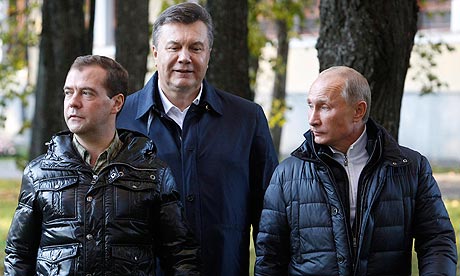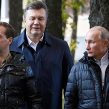
Ukraine and Russia Prepare New Gas Agreement
Publication: Eurasia Daily Monitor Volume: 8 Issue: 178
By:

Ukrainian President Viktor Yanukovych met with his Russian counterpart Dmitry Medvedev and Prime Minister Vladimir Putin near Moscow on September 24 in a last-ditch attempt to persuade the ruling tandem to lower gas prices for Ukraine. The officials involved have avoided saying anything specific about the results of the discussion. Yanukovych and Medvedev’s press service said immediately afterwards only that progress was achieved (Interfax, September 25). However, judging by the information that has been slowly fed to the media, a breakthrough was achieved allowing Yanukovych to obtain cheap gas for heavy industry bosses who back his party and avoid hiking gas prices for households ahead of the October 2012 parliamentary election. Gazprom will most likely secure a large share of Ukraine’s gas transit network if not full control, while gas cutoffs, feared in the worst-case scenario, will be avoided next winter.
Ukraine exerted psychological pressure on Russia ahead of the visit, trying to convince Moscow that Kyiv was ready to significantly cut gas imports from the country and thereby breach the 2009 gas contract. Moscow was told that Ukraine would introduce energy saving programs, replace gas with domestically extracted coal where possible, develop natural gas fields in the Black Sea and shale gas deposits, start importing gas from Azerbaijan and Turkmenistan, and build a liquefied natural gas terminal by 2014 in order to reduce Russian gas imports from 33 billion cubic meters (bcm) this year to as little as 7 bcm annually within five years. Yanukovych’s team also announced that the national oil and gas company Naftohaz Ukrainy would be restructured according to Western standards so Gazprom will stand little chance of a successful takeover, and made clear that Kyiv was ready to dispute the 2009 contract in court (see EDM, September 9).
Much of that was bluff. Most of the alternatives to Russian gas named by Kyiv are hardly cheaper even if its price keeps rising, while others, like boosting gas extraction in the Black Sea, will take years to implement. Moscow has insisted that Ukraine should either join the Customs Union (Russia, Belarus and Kazakhstan) or allow a takeover of Naftohaz by Gazprom. Kyiv chose the latter option, judging by leaks to the press and recent statements by Ukrainian Prime Minister Mykola Azarov. Also, Russia probably adopted a milder approach in the talks due to problems with the implementation of the South Stream project, which together with the recently launched Nord Stream pipeline could, as Kyiv feared, have rendered useless Ukraine’s rusting pipelines carrying gas to the EU.
Gazprom’s chief Aleksey Miller announced on September 26 that some progress was achieved as a result of the Putin-Medvedev meeting with Yanukovych and his own subsequent meeting with Ukrainian Energy Minister Yury Boyko, but that it was too early to speak about specific figures. Miller said the two sides would once again discuss the issue by the end of this week (RIA Novosti, September 26). The daily newspaper Kommersant-Ukraine reported on the same day, quoting its sources close to the talks, that Moscow would no longer insist on Ukraine’s membership of the Customs Union. According to Kommersant’s sources, Moscow agreed to focus on energy matters rather than insisting on Customs Union membership for Ukraine. Yanukovych reportedly offered Russia a share in Ukraine’s gas transit network, and Ukrainian and Russian officials contacted by Kommersant predicted that a consortium with Russian participation would be set up to manage Ukraine’s pipelines.
The website lb.ua reported on September 25, quoting sources within the Russian government, that Ukraine would receive only 20 percent of shares in the consortium. Another 20 percent would be held by one German company involved in Gazprom’s projects and the rest would go to Gazprom, according to lb.ua’s report. If so, Gazprom will de facto control the consortium and Ukraine’s pipelines. This is exactly what Moscow wanted from the very outset.
More about the informal agreements emerged on September 26. For some reason, Azarov, whom Yanukovych had not taken to Moscow, was the main newsmaker, while Yanukovych kept silent. Azarov told his cabinet that Russia agreed to lower gas prices for non-commercial consumers in Ukraine, while Kyiv would lower gas transit fees (www.zn.ua, September 26). This had been partially corroborated by Medvedev’s press service, which said that “significant progress” had been reached on transit fees (Interfax, September 25).
Azarov later told visiting Spanish senators that Russia had agreed to set up a trilateral consortium with the EU to manage Ukraine’s gas pipelines so that gas would continue flowing to Europe uninterrupted (UNIAN, September 26). Russia has thus far opposed EU participation in Ukrainian gas pipelines, preferring a Russia-Ukraine joint venture dominated by Gazprom, while Ukraine wanted to involve the EU in order to diminish Russia’s share. However, participation of EU companies linked with Gazprom could be a compromise solution. Addressing journalists on September 27, Azarov said that he was “satisfied with Russia’s constructive approach” and that he hoped Russia would charge less for gas already from next year (Interfax-Ukraine, September 27). This radically differed from Azarov’s routine accusations against Russia of unfair treatment before Yanukovych’s visit to Moscow.




